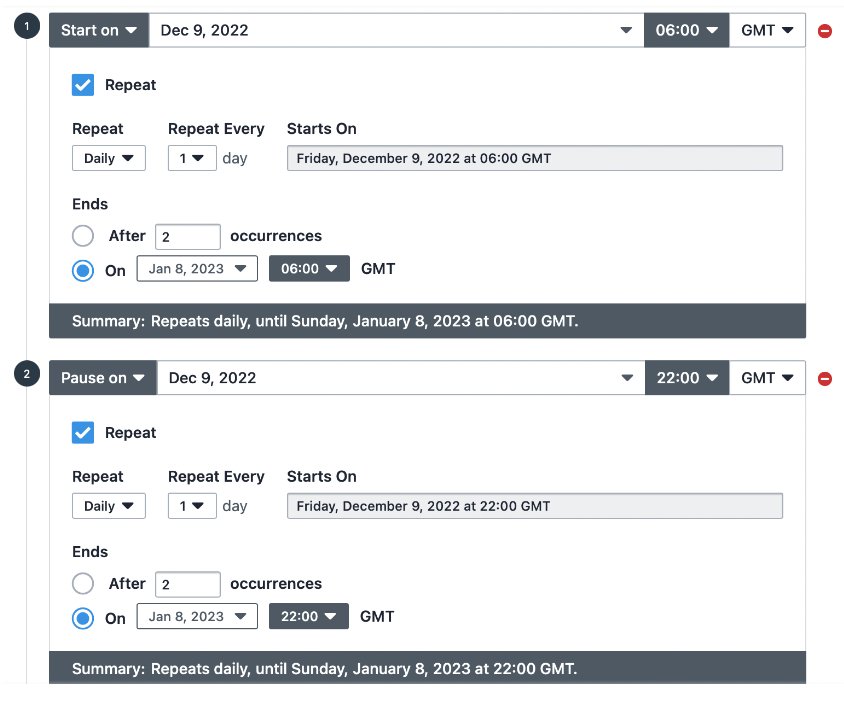What is campaign scheduling?
Campaign scheduling is the process of specifying the start and end dates and times for a campaign. It allows you to control the timing of your campaigns and ensure that they only run during specific times and dates. This can be useful in order to align your campaigns with specific events, promotions, or holidays and reach the right audience at the right time.
Few examples of scheduling campaigns
Let’s say you own a same-day-delivery online bakery shop and you want to run a test campaign during morning rush hour to see how a flat 25% off on your newly-launched breakfast pastries performs. You can schedule it to start at 6 AM and pause it at 12 PM every day for the next two weeks.
Now imagine you own an e-learning platform and want to run a personalized campaign for visitors who searched for weekend classes. So, you decide to show a 20% off promotional offer only on weekends. For this one, you can start the campaign, let’s say, at 8 AM on Saturday and pause it at 10 PM on Sunday.
You can also repeat the schedule of these campaigns so that you don’t have to set a reminder for constant adjustments.
Why you should schedule your campaigns
At first glance, scheduling might not seem like an option you’d need when setting up a campaign. Setting goals, distributing traffic or selecting segments take precedence over campaign scheduling. However, here are several benefits of scheduling campaigns:
Maximize campaign impact
Scheduling allows you to run your campaigns during the most optimal times, when your target audience is most likely to be active, maximizing the impact of your campaigns. Imagine you run a website and want to target busy working professionals with a special promotion during their lunch hour. By scheduling the promotion to run from 12 PM to 2 PM, you maximize the impact of the promotion by ensuring that it is delivered to the target audience at a time when they are most likely to take a break from work and actively engage with their devices.
On the other hand, if the promotion was scheduled to run during morning hours when your target audiences are likely to be busy, the impact of the promotion would be significantly reduced. This way, you can improve the effectiveness of your campaigns and drive better results.
Align with events and promotions
Scheduling allows you to align your campaigns with specific events, promotions, or holidays, increasing the relevance of your messaging and improving conversion rates. Suppose you want to A/B test a promotional offer on all winter wear on your shopping website on the occasion of Christmas. By scheduling the promotion to run during the holiday season, you ensure that it is delivered to your audience at a time when they are in the holiday spirit and actively shopping for gifts. You can easily schedule your campaign so it automatically goes live with the start of the festival and goes off after it’s over.
Avoid conflicting campaigns
Scheduling helps you avoid conflicts with other campaigns or events, ensuring that your campaigns run smoothly and without interruption. Let’s say you have two personalization campaigns – one targeting students with a 10% discount offer, and another targeting first-time visitors with a free trial offer. If both campaigns were running at the same time, a student who is a first-time visitor would receive both offers, which could be confusing and lead to decreased effectiveness of both campaigns.
Through this process, you can avoid this conflict by running the campaigns at different times. For example, you could schedule the student discount campaign to run from 9 AM to 5 PM on weekdays, and the first-time visitor campaign to run from 5 PM to 9 PM on weekdays. This ensures that only one campaign is running at a time and avoids overlap between campaigns.
Better data analysis
Campaign scheduling allows you to collect data over a defined period, making it easier to analyze and compare results. All of the above benefits will ensure that the data you collect during a campaign is relevant and meaningful. Needless to say, better data analysis gives quality insights into the impact of your campaigns on target audiences and facilitates data-driven decision-making.
How VWO helps you with campaign scheduling
VWO makes campaign scheduling a breeze! Whether you’re looking to run an A/B test or a personalization campaign, VWO makes it easy to schedule your campaigns to run at the right times, so you can get the best results.
Let’s see features that let you schedule a campaign:
Start on – Set a start date and time for your campaign, making sure that it’s set later and not earlier than the current time.
Pause on – Set a date and time for your campaign to pause and also make sure that it’s set later and not earlier than the current time.
Run till X users – You can stop your campaign automatically after a certain number of visitors have seen it by using the “Run till X Users” option.

If you want to make your campaign run at specific times automatically, you can do that using the Repeat option in VWO. Just set the schedule you want and repeat it as needed. For example, you can repeat a schedule every day for a whole month. However, the Repeat option is disabled by default, so you can change the repeat schedule to daily, weekly, or monthly based on your requirements.
VWO is an intuitive platform that comes with an array of capabilities and features that can drive forward your optimization programs. Sign up for a VWO free trial today to take control of your campaign scheduling and enjoy a lot more benefits.









